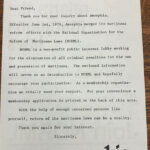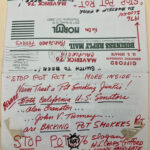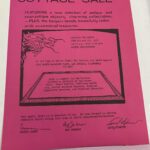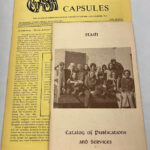The California NORML records capture the history of marijuana reform nationwide. The bulk of the collection consists of people, organization, subject, and legal files, but there are also administrative records, ephemera, and publications about marijuana. The collection includes mass mailings that document the history of the organization, like this letter from Amorphia:
Some letters (circa 1974-1980) show how people worldwide used California NORML as a resource. A writer from New Zealand requests (among other things) “a mixture of music to listen to stoned”; another correspondent asks them to send as many packs of rolling papers as they can get for $1.
Some of the organization’s mass mailings were returned, with the recipients’ clear criticism of California NORML. One is from Howard L. “Chips” Gifford, a “Maverick” Democrat who challenged – and lost to – incumbent California Senator John V. Tunney in the 1976 primary. Gifford wanted to “Stop Pot Rot.” (Tunney was, in turn, narrowly defeated by Republican S.I. Hayakawa in the general election). Another was returned by the folks at Sedition, a radical free newspaper in San José that “sought to revolutionize the nation.” They critiqued California NORML from the left, as a tool of “the established ruling class.” (https://scholarworks.sjsu.edu/sedition/)
The subject files in the California NORML records track legislation in all of California’s counties and in all 50 states. They also document issues that were central to the organization in the 1970s and 1980s, from medical and therapeutic uses of cannabis, to correcting misinformation about marijuana, to the war on drugs, to the dangers of herbicides, such as paraquat. These files also help put the fight for marijuana reform in the context of other struggles for change. They also suggest an interest in coalition building with – or at least support of – other political activists, from the White Panthers, an anti-racist political collective, to COYOTE (Call Off Your Tired Old Ethics), a sex workers’ rights organization. The folder titled “Gay Coalition,” for example, contains a flyer for a sale in Los Angeles “to support the Gay/Lesbian liberation projects of our household.” The members of “our household” included Morris Kight, who co-founded the LA chapter of the Gay Liberation Front and who helped lead a campaign against Dow Chemical and the use of napalm in Vietnam. (https://oac.cdlib.org/findaid/ark:/13030/kt6w1040bj/)
The California NORML records also include materials from other organizations and ephemera from their own events. These include publications from the Student Association for the Study of Hallucinogens (STASH), and a poster from the “First Right-to-Harvest Festival, “A Day on the Grass,” [1978]. The festival featured Margo St. James from COYOTE and medical marijuana activist Dennis Peron. (STASH formed to provide unbiased information on drugs and drug use by students at Beloit College in Wisconsin in 1968. They moved to Madison in 1974 and disbanded in 1980: https://search.library.wisc.edu/catalog/9911124865502121)
For more information about the collection, access the finding aid and catalog record for the California NORML records (BANC MSS 2009/122) here:
https://oac.cdlib.org/findaid/ark:/13030/c8dj5pkj/
https://search.library.berkeley.edu/permalink/01UCS_BER/1thfj9n/alma991074574479706532








![Poster for "A Day on the Grass" listing bands, speakers. Trees and [marijuana buds] are in the background](https://update.lib.berkeley.edu/wp-content/uploads/2024/07/Poster_Large-150x150.jpg)